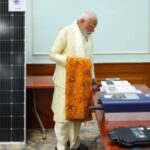Indonesia Joins UN-Led Energy Compacts, Pledges USD 122 Billion for SDG7 And Net Zero Goals

The Republic of Indonesia has formally introduced its Energy Compact, aligning itself with a global community dedicated to achieving Sustainable Development Goal 7 (SDG7) and net-zero objectives. This milestone in Indonesia’s energy transition is accompanied by a substantial financial commitment exceeding USD 122 billion. The funding is earmarked to elevate the share of renewable energy to an ambitious 23 per cent by 2029, with a strong emphasis on expanding solar and wind power capacities to 5.3 GW.
A key element of Indonesia’s strategy is to enhance grid connectivity in selected areas, facilitating greater penetration of renewable energy, especially in industrial estates and economic zones. Beyond SDG7, Indonesia’s broader sustainable development ambitions encompass cross-cutting indicators, requiring significant financial investments of up to USD 272 billion by 2030. Already, the government has identified USD 5 billion in investments to expand renewable energy capacity by 2030.
The nation aims to improve the energy intensity of its economy with a target reduction of 1 per cent per annum. Simultaneously, Indonesia is committed to reducing annual greenhouse gas emissions in the energy sector by 2030, aligning with the global objective of achieving net-zero emissions by 2060.
Complementing the Energy Compact, Indonesia’s Joint Energy Transition Plan (JETP) focuses on community preparation and addresses challenges such as the creation of equitable green jobs. The government actively engages financial authorities, pushing regulatory efforts to create roadmaps for sustainable finance using instruments like green bonds and SDG-linked bonds.
Recent government regulations on energy conservation mandate nationwide implementation of energy efficiency programs, including mandatory energy management, minimum energy performance standards (MEPS), labelling of electrical appliances, electrification, electric vehicle (EV) implementation, fuel economy standards, and public awareness campaigns.
H.E. Dr. Vivi Yulaswati, Deputy Minister for Natural Resources and Maritime Affairs and Head of SDG Secretariat, BAPPENAS, Government of Indonesia, highlighted Indonesia’s commitment at COP28, stating, “Through the Energy Compacts, Indonesia is focusing on massive development for renewable energy, including floating solar panels, mandatory biomass, and transitioning from diesel to renewable energy power plants.”
Damilola Ogunbiyi, CEO and Special Representative of the UN Secretary-General for Sustainable Energy for All, commended Indonesia on its ambitious Energy Compact, stating, “This reflects Indonesia’s unwavering commitment to sustainable development and a greener future. The Energy Compact aligns with global efforts to combat climate change and sets a high standard for others to follow.”
Energy Compacts are voluntary commitments launched at the High-Level Dialogue on Energy in 2021, designed to spur action towards SDG7 in line with net-zero goals. They were recognized as a High-Impact Initiative for achieving the SDGs by the Secretary-General in 2023.




































































































































































































































































































































































































































































































































































































































































































































































































































































































































































































































































































































































